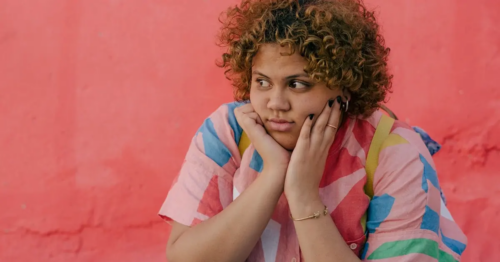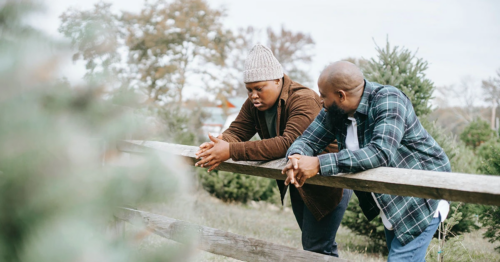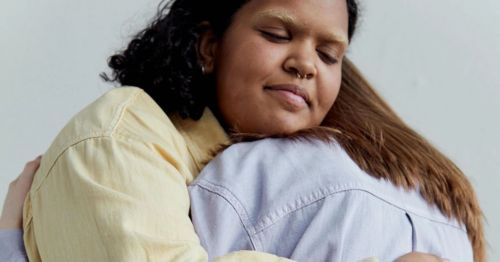
Table of Contents
How to Be a Better Ally to Your LGBTQIA+ Friends

Written By: Alex Bachert, MPH
June 17, 2022
6 min.
Coming out, or inviting in, during teen and adolescent years can be tough. Here’s how to support your friends as they share their sexual orientation or gender identity.
Learn more about our Clinical Review Process
Table of Contents
Having a friend “invite you in” is a big deal. (And we don’t mean inviting you in to watch a movie or to grab a snack.) Inviting in, or coming out, means that a person has gained clarity about their sexual orientation or gender identity and they’re choosing to share that information with you.
If your friend is like most young people, they’ve probably decided to come out to a close friend before sharing the news with their parents. In fact, a study by the Pew Research Center said that it’s pretty common for LGBTQ+ youth to come out to their families last, especially for individuals who identify as bisexual.
Receiving this sort of news is likely a testament to the strength of your friendship and your friend’s opinion of you. You probably feel honored, but also maybe a little bit nervous about what to do with this information and how to best support your friend. Don’t worry; Charlie Health has got you covered. Here, we’ll discuss how to be an ally to your friend as they navigate the process of sharing their sexual orientation or gender identity.
ABC’s of LGBTQIA+
LGBTQIA+ language is always changing and evolving, and can sometimes mean different things to different people, so don’t feel silly if there’s a term that you don’t understand. Instead, take the time to educate yourself on the LGBTQIA+ world so that you can better support your friend.
Let’s start with the basics: LGBTQIA+.
- Lesbian: A female who is physically, romantically, or emotionally attracted to another female.
- Gay: A male or female who is physically, romantically, or emotionally attracted to someone of the same gender.
- Bisexual: Someone who is physically, romantically, or emotionally attracted to more than one gender.
- Transgender: A term for people whose gender identity and/or gender expression is different from what is typically associated with the sex they were assigned at birth.
- Queer: A term for people whose sexual orientation is not exclusively heterosexual or cisgender. In these cases, the terms lesbian, gay, or bisexual might be too limited or associated with cultural connotations that don’t resonate with that person.
- Questioning: A term to describe someone who is questioning their sexual orientation or gender identity.
- Intersex: A term to describe a range of natural body variations that don’t fit into conventional definitions of male or female. For example, some people are born with biological traits, such as hormonal levels or genitalia, that don’t match what is typically identified as male or female.
- Asexual: A term used for people who don’t experience or experience a low level of sexual desire. Asexual individuas can still experience other forms of attraction such as romantic attraction.
- +: Any other sexual orientation or gender identity along the spectrum of sexual and gender identities that wasn’t previously mentioned.
You also might be wondering about the difference between “coming out” and “inviting in.” Coming out is the traditional term for the process of sharing one’s sexuality or gender identity both privately and publicly. The idea of inviting in shifts the narrative to empower LGBTQIA+ individuals to choose who they want to share their sexuality or gender identity with. It’s based on the idea that your sexuality and gender identity are yours (and yours alone) to share on your own terms.
Do you need more support with
your mental health?
Charlie Health can help.
Advice on supporting a friend who’s coming out
Show gratitude
When a friend chooses to invite you in, they’re essentially saying that they trust you with this important piece of who they are. Regardless of whether you’re the first person they tell or the last one to hear it, show your appreciation by saying “thank you for trusting me with this.” It takes courage to open up about your sexual orientation or gender identity and this simple phrase shows that you understand and appreciate their vulnerability.
Choose your words wisely
Your friend could probably use some love and support, even if they don’t come out (pun intended) and ask for it. Coming out can be complicated and you’ll want to help assuage any lingering fear or anxiety your friend has about sharing their identity. High school is stressful enough, but think about how difficult it must be for a friend with a big secret; a national survey shows that 85 percent of LGBTQ+ teens between 13-17 years rated their average stress level as 5 or higher on a 1-10 scale.
Once your friend opens up, allow them to have the floor until it’s clear that they’re finished speaking, and don’t push or pry for information that they’re not ready or willing to share. Avoid reactions like “I had a feeling” or “everyone knows you are” as they can exacerbate a person’s stress and apprehension. And this probably goes without saying, but it’s best to keep any doubts or thoughts of rejection to yourself.
If you’re looking for a way to be supportive, offer to help your friend rehearse their coming out speech so that they can feel confident when telling the next person.
Respect their timeline and privacy
Just because your friend chooses to invite you in, it doesn’t mean that they’re opening up that door for everyone. Coming out is an ongoing process and LGBTQIA+ individuals get to choose who they want to come out to and when. In short, it’s a life-long process!
Your friend might choose to share this news with you, but it doesn’t mean that they’re “out” and prepared to discuss their sexual orientation or gender identity with other people. No matter what, you don’t want to be responsible for outing someone who isn’t ready. Outing is a term used for publicly revealing another person’s sexual orientation or gender identity who would prefer to keep this information secret. A survey of 12,000 LGBTQ+ youth found that most students described being outed as “extremely stressful.”

Connect them with mental health support if needed
Coming out, and even being out, can cause an increase in anxiety, depression, or feelings of isolation. If you think your friend might benefit from professional health, group therapy and one-on-one therapy are great ways to help them connect with counselors and peers about any challenges they’re struggling with during their journey.
You can also share the contact information for a number of hotlines that are designed to support LGBTQIA+ youth.
- LGBT National Youth Talkline: 800-246-7743
- The Trevor Project: 866-488-7386
- The Gay, Lesbian, Bisexual and Transgender National Hotline: 888-843-4564
- The Anti-Violence Project: 212-714-1141
- National Suicide Prevention Lifeline: Call 988 or text the Crisis Text Line: HOME to 741741
Help them build their chosen family
“Chosen family” are the family groups and close relationships that are formed outside of a person’s nuclear family and bio-legal ties. These small groups create a bond and loyalty that runs much deeper than acquaintances or classmates. The idea can apply to anyone, but it’s particularly common among queer and transgender youth communities.
Also called “found families,” chosen families can be a real safety net for teens whose parents and families don’t accept their lifestyle. LGBTQIA+ youth are 120 percent more likely to experience homelessness than non-LGBTQIA+ youth, and found families can sometimes help teens find a safe place to stay. Reports show that homelessness among LGBTQIA+ youth is one of the greatest predictors of involvement with the juvenile justice system so finding this level of support is more important than ever.
Support your friend with Charlie Health
Charlie Health is committed to serving LGBTQIA+ youth in a safe, compassionate, and empowering environment. Our virtual IOP is designed to fit each client’s unique needs, plus help their families learn how to best support them as they navigate their journey toward healing and sustainable recovery from a wide variety of mental health disorders. If you think that your friend might benefit from learning more, connect them with Charlie Health today.
References
https://www.prisonpolicy.org/blog/2019/01/22/lgbtq_youth/
https://www.nytimes.com/2022/05/12/learning/who-is-in-your-chosen-family.html
https://www.thetrevorproject.org/
https://www.charliehealth.com/intensive-outpatient-iop/individual-therapy
https://www.ncbi.nlm.nih.gov/pmc/articles/PMC3649127/
https://assets2.hrc.org/files/assets/resources/2018-YouthReport-0514-Final.pdf
https://www.fullerton.edu/lgbtq/_resources/pdfs/Coming%20Out%20vs.%20Inviting%20In%20Brochure.pdf





